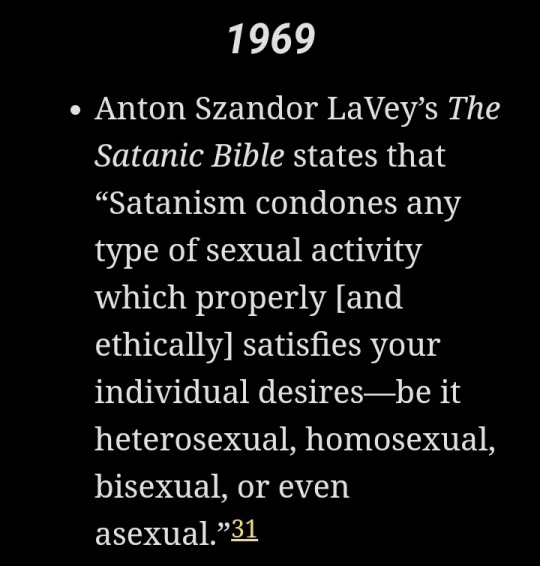#LaVeyan
Quote
“Why should I not hate mine enemies―if I "love" them does that not place me at their mercy?”
― Anton Szandor LaVey, The Satanic Bible
#anton lavey#antonlavey#laveyan satanism#laveyansatanism#laveyan#satanism#satanic bible#satanicbible#satanic pride#satanicpride#quotes#quote
11 notes
·
View notes
Text

Can't believe I'm back on here after leaving tumblr for like 5 years. Welp anyways a lot has changed haha meet Lillith🖤✨
#lillith#lillithlaveyan#lillithlaveyanscott#LaVeyan#drag#drag queen#Drag queens#drag artist#drag makeup#drag hair#drag style#drag clothing#makeup#makeupartist#mua#model#atlanta#ATL#Atlanta drag#ATL drag
0 notes
Link
Tell us a story that this reminds you of!
#graphicdesign#sigiloflucifer#symbol#satanic#god#lucifer#gold#golden#luciferian#satanism#satan#devil#demon#atheistic#laveyan#witches#antichrist#artistic#paganism#worship#worshipper
0 notes
Note
I don’t want to associate myself with Anton LaVey after having just finding out he was a nazi, but what do I call myself if not a Laveyan satanist? I agree with the teachings, not with the person, but I don’t know what to do.
You would call yourself a LaVeyan Satanist if that's what you are, but you might also consider taking a much deeper look at those teachings of his and what else is buried in them.
If you aren't already familiar with Might Is Right, the fact that our dude plagiarized it and sanded off its rougher ideas for the "Book of Satan" section of The Satanic Bible ought to tell you something about our guy's fundamental principles, which do align pretty well with white nationalism in lots of ways.
Longer post about that here.
Be a Satanist, but be critical and don't be beholden to any would-be prophets or dogmas that are harmful.
That's our advice, anyhow.
100 notes
·
View notes
Text
Blog Post: Embracing the Abyss: My Journey into Anton LaVey's Satanism

Posted by Damien Harker | Date: 13 September, 2023
Greetings, fellow seekers of the shadows,
Recently, I embarked on a new journey into the realms of Satanism, specifically delving into the wisdom of Anton Szandor LaVey, the enigmatic founder of the Church of Satan. As a metalhead, horror enthusiast, and lover of all things dark and mysterious, it felt like a natural progression to explore this intriguing philosophy.
My initiation into the world of LaVeyan Satanism began with "The Satanic Bible," a collection of essays penned by the High Priest himself. What initially drew me in were not the sensationalized stereotypes that surround Satanism, but rather the intriguing blend of individualism, rational self-interest, and unconventional wisdom that LaVey presented.
Satanism: Beyond the Misconceptions
Before diving into the book, I had to confront the misconceptions and misconstrued notions often associated with Satanism. Contrary to popular belief, Satanism, as articulated by Anton LaVey, isn't about devil worship, black magic, or malevolent rituals. Instead, it's a philosophy that champions personal empowerment, critical thinking, and a rejection of societal norms that stifle individuality.
The Nine Satanic Statements
One of the key aspects that resonated with me in "The Satanic Bible" was the Nine Satanic Statements. These statements serve as foundational principles, challenging us to question dogma and embrace the idea that we are our own gods. It's about taking control of our destinies, acknowledging our desires, and unapologetically pursuing them.
The Satanic Rituals: A Unique Perspective
While exploring the rituals presented in the book, I found LaVey's approach to ritualistic magic to be refreshingly pragmatic. Rather than supernaturalism, his rituals are psychological tools designed to tap into the power of the mind and one's own will. This practical perspective aligns with my fascination for the mystical and the psychological, bridging the gap between the macabre and the cerebral.
Embracing the Darkness
In the world of Anton LaVey, Satan is not a literal deity but a symbol of individualism, rebellion, and the untamed aspects of human nature. It's a philosophy that encourages us to embrace our darkness and to acknowledge that we are creatures of both light and shadow. This, for me, is a profoundly liberating concept.
My journey into LaVeyan Satanism is just beginning, and I'm eager to delve deeper into its tenets, explore its symbolism, and engage with like-minded individuals who share my fascination with the dark and unconventional. I'm not here to convert anyone, but rather to share my own experiences and perspectives as I navigate this intriguing path.
So, fellow shadow-dwellers, stay tuned for more updates on my exploration of Satanism, the occult, and all things that dwell in the twilight realm. And remember, sometimes, the most profound revelations are found in the depths of darkness.
Hail Satan, and hail the pursuit of individuality and self-discovery!
Until next time,
Damien Harker 🤘🖤
#anton lavey#church of satan#esoteric#priest kink#dark art#666#demonolatry#blasphemy#ave satanas#hail satan#laveyan satanism#satanic#satanic black mass#satanism#satanist#Itheist
63 notes
·
View notes
Text
Calling all Satanists!
Any age, any kind of Satanism. I require some assistance. I’m doing a research paper on modern Satanism (for an English class but I chose the topic because I care about it) & I’d like to learn about the beliefs & experiences of real individual Satanists. I’ve made a google form asking questions about this. I’d appreciate it so greatly if any Satanists reading this could fill it out. It’d be best if you fill it out by Wednesday 9/13 but if not that’s okay & it’ll still be useful after that.
Thank you! Ave Satanas
Reblogs much appreciated too so hopefully more Satanists can see this
#Satanist#satanism#the satanic temple#tst#the church of satan#luciferianism#non theistic Satanism#theistic satanism#laveyan satanism#occultist#witch
58 notes
·
View notes
Text

145 notes
·
View notes
Text
I feel like we are in the era of rebirth of religious fanaticism and not even the fun kind. These people dont even research actual theology they just want to larp as trad religion of the month and have a superiority complex about being sex repressed
#bring back cringy laveyan satanism n fedora atheism shit wasnt half as bad#and pluto aquarius is going to make it WORSE
20 notes
·
View notes
Text
The Satanic Bible, by Anton LaVey

Title: The Satanic Bible
Author: Anton Szandor LaVey
Publisher: William Morrow Paperbacks
Publishing Date: December 1, 1969 (First Edition)
ISBN-10: 0380015390
ISBN-13: 978-0380015399
Alright, let's start with the elephant in the room. This little book is often the only thing people read on Satanism, and for good reason - it made quite a splash when it was published.
Considered the foundational text of the Church of Satan and their specific style of atheistic Satanism (often called LaVeyan Satanism), The Satanic Bible is part philosophy, part religious teaching, and part magical instruction. LaVey is well known for his stance that humanity does not need God, and that believing in God (or Satan, for that matter) as real entities serves only to hold back our potential. However, LaVey argues that humanity does need religion, and that religion requires dogma and ceremony. The dogma and ceremony LaVey offers to the reader is based on one's own happiness and self-satisfaction, as opposed to the Christian values of self-sacrifice for the greater good. His Nine Satanic Statements, Eleven Satanic Rules of the Earth, and Nine Satanic Sins are easy to read and understand, and seem to be the inspiration for other Satanist's lists of values, such as The Satanic Temple's Seven Fundamental Tenants.
LaVey embraces sexuality and indulgence, framing sexual energy as the best and most potent source of power for magical workings. Magic is described not as an appeal to a higher power but a seizing of one's own fate, aiming for success and happiness through the manipulation of the world around oneself. The practices he recommends are rooted in ceremonial magic, especially Enochian magic.
The Satanic Bible has had multiple editions and translations since its original publication and is widely available through most online book retailers, as well as sometimes being stocked in magical and metaphysical shops.
[DISCLAIMER: The Devil's Library is not affiliated with any of the previously mentioned groups or authors. It is an independent project by a single Satanist. Do not mistake my mentioning of an author or group as endorsement for their beliefs and practices.]
Beneath the cut you'll find my personal review and opinions on this book.
I've said before on this blog that I am not LaVeyan, and that's still true. While I greatly respect the concept of a non-theistic religion and I lift my glass to all those who work hard to form such religions, I prefer a theistic view of the world. On top of that, LaVey's philosophy does little for me. In truth I consider LaVey's work to not be particularly revolutionary in terms of philosophy. He was a self-admitted fan of Ayn Rand and his brand of Satanic individualism has oft been compared to Randian philosophy with a coat of occult paint slapped on top - I think that evaluation holds true. His magical system also strikes me as unoriginal, given he simply reworked the Enocheon keys. My overall evaluation of the man was that he was a lazy philosopher and a lazy magician, but a skilled showman, and that's how he pulled in as many followers and critics as he did. People were rejecting God and practicing ceremonial magic long before LaVey came along. He just cultivated a compelling aesthetic around it.
I think it's safe to say the book is a product of its time and creator. LaVey is both progressive and regressive, endorsing kink and queer sexuality while also objectifying women in his magical practice (LaVey is, as far as I can tell, the originator of the Satanic tradition of using a nude woman's body as an altar, and he makes a note that during ritual, men should wear robes, but women should dress scantily in order to titillate the men) and having some deep misunderstandings about asexuality. It's also not to be taken lightly that while as far as I'm aware, LaVey himself didn't profess to be a white supremacist, his fondness for Ayn Rand shows a fondness for fascism, he certainly rubbed elbows with white supremacists, and various individuals and groups that broke off from the original Church of Satan have been noted as having a range of Nazi-adjacent views and values, namely the Temple of Set. His list of "Satanic names" is also a very sloppily cobbled together list of names of any god, deity, or spirit who's ever been even slightly associated with negativity, utterly ripped from their cultural context and reduced to keywords that, I assume, LaVey expects the readers to either claim as names of their own or use in rituals. The list includes outright racist cultural appropriation, such as the inclusion of Kali's name, to ignorant misrepresentations of myth, such as calling Loki the "Teutonic devil." As always, I recommend referencing scholarly and culturally conscious resources when it comes to discussions of other religions and mythologies. Do not take a single writer with no credentials at face value.
That being said this is a book I generally recommend people read, with the added note that taking it entirely at face value and assuming it's the one true Satanic text is a mistake. The Satanic Bible is integral to our religious history at this point, but we need not cling to it as entirely or even mostly correct. It is also useful to be familiar with it when interacting with other Satanists, as it's possibly the most commonly read book in the entire religion, so like it or hate it, you probably should have some opinion on it.
#satanism#atheistic satanism#the satanic bible#anton lavey#laveyan satanism#satanic magic#the devil's library#the devils library#tdl#bookshelf#my posts
41 notes
·
View notes
Text
On April 11, 1930, a man was born who once introduced the concept of Satanism to the world. He was unafraid of millions of sideways glances, words, and even threats.
He became an example to many, and to this day, even after his death, he remains a terrifying nightmare to religious communities of that time.
Today would have marked the 94th birthday of the High Priest Anton Szandor LaVey, the founder of the Church of Satan, and the author of many books.





14 notes
·
View notes
Photo


Zeena LaVey. <3
56 notes
·
View notes
Text

Wow. Uncommon LaVey W
#asexual#satanism#i am NOT a laveyan satanist or really a satanist at all but i am an occultist and this was nice to see
11 notes
·
View notes
Text

#she is the truth of the Baphomet!#hail the white sorceress#laveyan satanism#satanic cult#666#lady Lucifer#ave maria#ave satanas#jayne Mansfield#anton lavey
15 notes
·
View notes
Link
What's the first word that comes to mind seeing this?
#graphicdesign#sigiloflucifer#sigilofbaphomet#samael#lilith#golden#pentagram#symbol#satanic#god#lucifer#gold#luciferian#satanism#satan#devil#demon#atheistic#laveyan#witches#antichrist
0 notes
Text
Satanism Explained
Satanism is a diverse and multifaceted term that encompasses a range of beliefs and practices. It is important to note that there are different branches or interpretations of Satanism, and they can vary significantly in their ideologies and values.
Here, I'll provide an overview of two distinct branches: theistic Satanism and LaVeyan Satanism.
Theistic Satanism:
Theistic Satanism refers to a belief system in which individuals worship or venerate Satan as a deity. Adherents of theistic Satanism often view Satan as a real being or a representation of primal and rebellious forces. They may engage in rituals, prayers, and other forms of worship dedicated to Satan. It's worth mentioning that not all theistic Satanists engage in harmful or malevolent practices; some emphasize personal empowerment, individualism, and a rejection of societal norms.
LaVeyan Satanism:
LaVeyan Satanism, also known as modern Satanism, was founded by Anton LaVey in the 1960s. LaVeyan Satanists do not believe in the existence of a literal Satan but rather see Satan as a symbol representing individualism, self-indulgence, and human potential. They embrace the idea of self-preservation and emphasize rationality, critical thinking, and personal freedom. LaVeyan Satanism promotes the pursuit of personal desires and encourages adherents to question societal norms and religious dogma.
It's important to note that the vast majority of Satanists, whether theistic or LaVeyan, do not engage in criminal or harmful activities. While some individuals may adopt the symbols or aesthetics associated with Satanism for shock value or rebellious expression, it does not necessarily indicate adherence to Satanic beliefs or practices.
Remember, this is a general overview, and Satanism is a complex and varied topic.
36 notes
·
View notes
Text

It seems like the world is gonna end soon, and I couldn’t be happier
#atheist#laveyan satanism#church of satan#satanism#satanist#satanic#black aesthetic#fuck#goth aesthetic#tired
76 notes
·
View notes